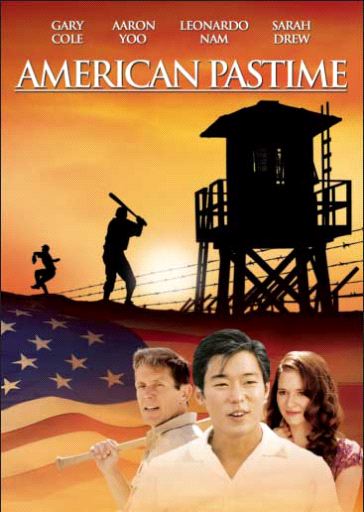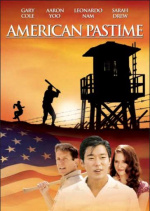American Pastime
American Pastime
Also playing as part of the VC Film Festival 2007
Kaz Nomura (Masatoshi Nakamura) and his wife Emi (Judy Ongg) stoically struggle to maintain a normal life after being forcibly relocated to an internment camp in the remote town of Abraham, Utah.
Older brother Lane Nomura, determined to prove his loyalty, enlists in the U.S. Army’s celebrated 442nd Regimental Combat Team. His brother Lyle is a musician and a baseball superstar who’s embittered when his chance to attend college on a full baseball scholarship is cut short by the war. Lyle soon meets Katie Burrell (Sarah Drew), daughter of camp guard Billy Burrell (Gary Cole), and the two teenagers begin a romance. When the romance between Katie and Lyle is discovered, the Burrells and the Nomuras find themselves at odds with each other, even though they’re on the same side of the war.
Billy Burrell, a man whose dream is one more shot at the big leagues, is a star of the minor league baseball club, the Abraham Bees. If not for the war, baseball is a passion he could have shared with Kaz and his sons, who also play for the love of the game.
To show the town of Abraham their fighting spirit, the camp residents propose a baseball game between Billy's team and the Topaz camp's squad and both sides square off in a contest. An unusual wager is proposed, the stakes of which are a large sum of money for the locals; dignity and honor for the Japanese Americans. The internment camp families unite behind their team, determined to show that they, too, are patriotic Americans. And through the all-American pastime of baseball, the town of Abraham and the Topaz detainees discover that they’re really not that different after all – they’re both Americans who share the same values, even when a war almost tears them apart.
From filmmaker Desmond Nakano (American Me, White Man’s Burden) and set against the background of the 1940’s U.S. internment camps, the film weaves a rich story of a Japanese American father and his two sons, whose love of family, country, music and the game of baseball help them find the strength to survive indignity and injustice.
American Pastime takes viewers into the lives of the Japanese American community at a time when their very foundations were shaken. Adding elements of humor, romance and action, the film is based on the true events of World War II’s U.S. home front, where 120,000 Japanese Americans, most citizens of this country, were uprooted from their homes and placed in remote internment camps because of a perceived security threat. The film’s story centers around one family in Utah’s Topaz camp where the community ironically uses baseball, for decades a part of the Japanese American fabric, as a way to rise above their daily hardships and adversity.
Gary Cole (HBO’s upcoming “12 Miles of Bad Road,” Talladega Nights, Office Space) stars in American Pastime, which also features Leonardo Nam (The Fast & Furious: Tokyo Drift, Vantage Point), Aaron Yoo (Disturbia, TV’s “Bedford Diaries”), Masatoshi Nakamura (famed Japanese actor and singer), Judy Ongg (renowned international performer), Sarah Drew (TV’s “Everwood,” Radio) and Jon Gries (Napoleon Dynamite).
The internment of Japanese Americans during World War II was one of the worst violations of civil rights in the history of the United States. After Pearl Harbor, more Japanese attacks on the U.S were feared. Bowing to community pressures (primarily from the West Coast), President Roosevelt, on this day exactly 65 years ago, signed Executive Order 9066, which resulted in the forcible internment of 120,000 people of Japanese ancestry. The government and the Army, using the term "military necessity," locked up men, women and children in 10 remote camps in isolated desert areas of Arizona, California, Utah, Idaho, Colorado, Wyoming and Arkansas. By the end of the war, however, after being incarcerated for up to four years – surrounded by barbed wire and armed guards - not one of these U.S. citizens was ever convicted or charged with any crime.
Despite internment, Japanese Americans also fought and died in the war. Initially classified as 4-C (“enemy aliens ineligible for the military), Japanese Americans proved to be so skillful they were eventually allowed to serve in the U.S. Army. The 442nd Regimental Combat Team of the United States Army was their unit, and they fought in North Africa, Italy, southern France, and Germany. The “Go For Broke” unit became one of the most highly decorated in U.S. Military history. In a strange twist of fate, 5,000 survivors of the Jewish concentration camp Dachau were liberated by members of the 442nd on April 29, 1945.
Executive Order 9066 was rescinded by President Roosevelt in 1944, and the last of the camps was closed in March, 1946. In 1988, President Reagan signed legislation apologizing for the internment on behalf of the U.S. government and reparations were paid to surviving internees. In recent years, the Congress has adopted legislation authorizing up to $38 million in federal funds to preserve and restore the 10 internment camps and 17 assembly centers as historical landmarks.
American Pastime screenplay is by Desmond Nakano & Tony Kayden. Barry Rosenbush, who executive produced the 6-time Emmy-nominated hit “High School Musical,” produced along with Tom Gorai and Terry Spazek. David Skinner and Arata Matsushima are executive producers and Kerry Yo Nakagawa, associate producer. Director of photography is Matthew Williams; Mark Yoshikawa is the editor. Production Designer is Christopher Demuri. Casting by Vickie Thomas - Los Angeles. Composer is Joseph Conlan, with baritone saxophone solos by Verdi (Woody) Woodward contributing to the score. American Pastime is a Warner Home Video presentation of a T & C Pictures, ShadowCatcher Entertainment, Rosy Bushes production of a Desmond Nakano film.
Older brother Lane Nomura, determined to prove his loyalty, enlists in the U.S. Army’s celebrated 442nd Regimental Combat Team. His brother Lyle is a musician and a baseball superstar who’s embittered when his chance to attend college on a full baseball scholarship is cut short by the war. Lyle soon meets Katie Burrell (Sarah Drew), daughter of camp guard Billy Burrell (Gary Cole), and the two teenagers begin a romance. When the romance between Katie and Lyle is discovered, the Burrells and the Nomuras find themselves at odds with each other, even though they’re on the same side of the war.
Billy Burrell, a man whose dream is one more shot at the big leagues, is a star of the minor league baseball club, the Abraham Bees. If not for the war, baseball is a passion he could have shared with Kaz and his sons, who also play for the love of the game.
To show the town of Abraham their fighting spirit, the camp residents propose a baseball game between Billy's team and the Topaz camp's squad and both sides square off in a contest. An unusual wager is proposed, the stakes of which are a large sum of money for the locals; dignity and honor for the Japanese Americans. The internment camp families unite behind their team, determined to show that they, too, are patriotic Americans. And through the all-American pastime of baseball, the town of Abraham and the Topaz detainees discover that they’re really not that different after all – they’re both Americans who share the same values, even when a war almost tears them apart.
From filmmaker Desmond Nakano (American Me, White Man’s Burden) and set against the background of the 1940’s U.S. internment camps, the film weaves a rich story of a Japanese American father and his two sons, whose love of family, country, music and the game of baseball help them find the strength to survive indignity and injustice.
American Pastime takes viewers into the lives of the Japanese American community at a time when their very foundations were shaken. Adding elements of humor, romance and action, the film is based on the true events of World War II’s U.S. home front, where 120,000 Japanese Americans, most citizens of this country, were uprooted from their homes and placed in remote internment camps because of a perceived security threat. The film’s story centers around one family in Utah’s Topaz camp where the community ironically uses baseball, for decades a part of the Japanese American fabric, as a way to rise above their daily hardships and adversity.
Gary Cole (HBO’s upcoming “12 Miles of Bad Road,” Talladega Nights, Office Space) stars in American Pastime, which also features Leonardo Nam (The Fast & Furious: Tokyo Drift, Vantage Point), Aaron Yoo (Disturbia, TV’s “Bedford Diaries”), Masatoshi Nakamura (famed Japanese actor and singer), Judy Ongg (renowned international performer), Sarah Drew (TV’s “Everwood,” Radio) and Jon Gries (Napoleon Dynamite).
The internment of Japanese Americans during World War II was one of the worst violations of civil rights in the history of the United States. After Pearl Harbor, more Japanese attacks on the U.S were feared. Bowing to community pressures (primarily from the West Coast), President Roosevelt, on this day exactly 65 years ago, signed Executive Order 9066, which resulted in the forcible internment of 120,000 people of Japanese ancestry. The government and the Army, using the term "military necessity," locked up men, women and children in 10 remote camps in isolated desert areas of Arizona, California, Utah, Idaho, Colorado, Wyoming and Arkansas. By the end of the war, however, after being incarcerated for up to four years – surrounded by barbed wire and armed guards - not one of these U.S. citizens was ever convicted or charged with any crime.
Despite internment, Japanese Americans also fought and died in the war. Initially classified as 4-C (“enemy aliens ineligible for the military), Japanese Americans proved to be so skillful they were eventually allowed to serve in the U.S. Army. The 442nd Regimental Combat Team of the United States Army was their unit, and they fought in North Africa, Italy, southern France, and Germany. The “Go For Broke” unit became one of the most highly decorated in U.S. Military history. In a strange twist of fate, 5,000 survivors of the Jewish concentration camp Dachau were liberated by members of the 442nd on April 29, 1945.
Executive Order 9066 was rescinded by President Roosevelt in 1944, and the last of the camps was closed in March, 1946. In 1988, President Reagan signed legislation apologizing for the internment on behalf of the U.S. government and reparations were paid to surviving internees. In recent years, the Congress has adopted legislation authorizing up to $38 million in federal funds to preserve and restore the 10 internment camps and 17 assembly centers as historical landmarks.
American Pastime screenplay is by Desmond Nakano & Tony Kayden. Barry Rosenbush, who executive produced the 6-time Emmy-nominated hit “High School Musical,” produced along with Tom Gorai and Terry Spazek. David Skinner and Arata Matsushima are executive producers and Kerry Yo Nakagawa, associate producer. Director of photography is Matthew Williams; Mark Yoshikawa is the editor. Production Designer is Christopher Demuri. Casting by Vickie Thomas - Los Angeles. Composer is Joseph Conlan, with baritone saxophone solos by Verdi (Woody) Woodward contributing to the score. American Pastime is a Warner Home Video presentation of a T & C Pictures, ShadowCatcher Entertainment, Rosy Bushes production of a Desmond Nakano film.
American Pastime Get Tickets
There are currently no showtimes for this film. Please check back soon.

